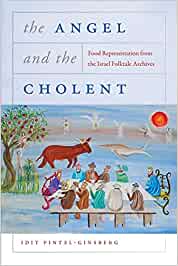Jewish identity and food are connected not only through the limitations and complexities of the rules of kashrut, but through the meanings beyond the immediate food connection. In The Angel and the Cholent, a collection of 30 folktales by Idit Pintel-Ginsberg there is a story about a Jewish woman from Libya who converted in order to join his Muslim husband. The smell of hamin reminds her of the life she left behind and gave her strength to return to her parents.
The tales reunited in the volume are compiled by the Israel Folktale Archives (IFA) named in honor of Dov Noy, at the University of Haifa. Since 2017, IFA´s collection was included in UNESCO´s Memory of the World program. The selection was made out of 180 tales whose plots relate to food. The stories do cover a vast geographical area: from Eastern Europe and Russia, to Morocoo, Libya or Iraq. There is also one story by a Muslim storyteller from Israel.
The collection is diverse also from the point of view of the characters featured: from the rabbi and the pauper, to the wife and the mother. The story may not be equal in terms of their originality - there is a variant of the ´Love like salt´ story - but for me, the most important part was the commentary, the way in which the specific story was contextualized from the geographical, historical and religious-traditional point of view. In this way, various elements of the text are outlined, compared and explained.
An important element of The Angel of the Cholent is its particular reading(s) of the food stories: as gender dynamic, as a marker of the interaction with other religious and ethnic groups, as an intricate social system, as a historical mirror of various evolutions within the majority as well. The critical feedback can be further use in other anthropological discoveries centered on food in other cultures and religions as well.
The ubicuity of food in our everyday life is a nourishment for the belly but equally nurtures the soul and the mind in its very personal special Jewish way.

No comments:
Post a Comment